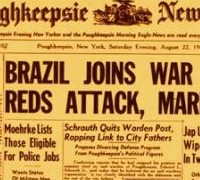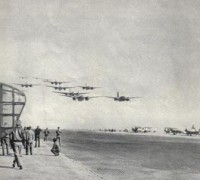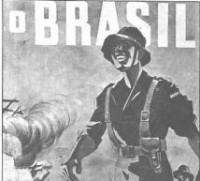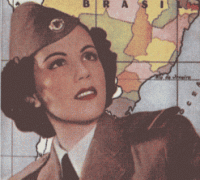- THE HARD ROAD TO WAR
14)THE LAST STRAW *
For the Brazilian government, it was a matter of prime concern the assurance of the Brazilian shipping and their valiant crews, the safety, put at stake, all of the sudden, due to the war circumstances. Only a momentary incapacitation, in its fullness, could explain the delay in such a human providence execution.
Brazilian consul in Port of Spain, in charge of the law suit restored on the occasion of the Tamandaré’s sinking, in June of 1942, referring to the magnanimous problem of the convoys, reporting to the practice of previous law suits, affirmed that his opinion about the matter was the following, “the convoy system should be, compulsory, adopted to all national ships that had to cross the zones where it would be expected to find enemy submarines.
The competent Brazilian authorities should not allow the dispatch of the ships that would sail isolated on those particular zones”. He reminded as well that machinery conditions of all ships should be examined, included in the convoys, before the dispatch of the ship in question, in order to prevent that one unit, in high sea, to delay the march of the others”.
He mentioned, illustratively, the case of the steamer Lídia, from the Matarazzo company, that having reached Port of Spain, in its trip to the US, with its machinery in bad state, developing a medium speed of 5 to 6 miles, stayed there many weeks, unable of being incorporated in another convoy, due to its reduced speed and being unable to navigate isolated for being too much of an easy target to an enemy submarine, which would probably have a much higher speed even if it was submerged. The convoy’s resource began to be an imposition.
From long before, Germany had been threatening the allies with drastic retaliation, in the case of the neutral nations refuse to get lined up in its sphere of influence; those threats were put in practice when the results of the Rio de Janeiro’s conference, that consisted mainly in the proclamation of unanimous support of the continental nations to the United States.The immediate German response was the blockade of US Atlantic coast ports, and an equal hostility in the treatment of the ships that made use of those ports, appearing, for that matter, with great detachment the Brazilian’s merchant Navy.
The Brazilian government was very aware of their reality back then, through ambassador Pruffer’s distinguished and harsh statements, provoked by the Brazilian’s decision to sever relations with the ambassador’s country, in January of 1942, and the violent submarine campaign started to grow increasingly, since a considerable part of the U S naval force was moved to the Pacific, because of its delicate situation after the Pearl Harbor’s attacks, began to worry the U S government; besides the very modest naval resources of the allies, started to demand an escort to the extensive convoys sent to Great Britain and Russia, war’s mainly scenarios.
And then, Brazilian’s merchant navy, which important given services had accomplished in WW I and for its professional servitude were asked to navigate in dirty waters, infested by Nazi subs, whom would impose countless sacrifices, much superior to what was demanded to those who fought in 1917. About those sacrifices, commander Martins de Oliveira says: “its bigger pride was the certainty that all their sacrifice was dedicated to the country.
In the sea, the Brazilian’s merchant navy men felt all decent principles transformation. All that solidarity, that natural satisfaction that ruled in the surface of all oceans, confusing all merchant ships in the feeling of true fraternity cultivated and felt for all navy men, was being, little by little mined and destroyed, as much that the presence of a ship in the band of the horizon, reason of joy in yore, became now the source of mistrust feeling, which obliged the men to take cautious measures. “The ships crossed in silence; the biggest distance was saved from one another. No sincere friendly manifestations, the only thing they would care would be the mission the other ship was carrying.
The feeling of suspicion was general, none was trustworthy." the ocean that strengthens up, that educates and liberates nations, and where the action of its surface habitants were measured by the sincere loyalty, absolute solidarity and general humanity, were feeling, also, the ominous effects that emanated in the unsure atmosphere, that ruled, then, between the nations." the routine services, on board of the ships, was increased by the permanent vigilance in all areas of the horizon, aiming to attend immediately aid of the ships, airplanes and patrol submarines.”
The occasion would be extremely favorable once in the first week of August allied merchant convoys loaded with war materiel including badly needed Sherman tanks. U S hastily dispatched these tanks among other war supplies to Mal. Montgomery’s 8th Army entangled in a fierce sluggish battle against his legendary opponent, the desert fox, Mal. Erwin Rommel on the blazing sands of El Alamein, the easternmost push of Deutsche Afrika Korps. These convoys sailing along Brazilian northern coast called at Recife for replenishing, upkeep.
Aware of these proceedings the Germans broadcast beamed to Brazil in their daily radio emissions, threatened to take retaliatory actions of destruction, certainly with some ground given the presence of their subs in new assigned areas in South Atlantic narrows. Notwithstanding, the convoys journey went uneventful through the long route in the Atlantic, escorted by ships of south Atlantic force, the embryo of future Fourth Fleet.
https://www.youtube.com/watch?v=1Fo5RDjdMN0
Above, archival footage with scenes of Brazilian protesters rallying against Axis powers following the sinking of six Brazilian merchants which led the country to declare war on Germany and Italy.



